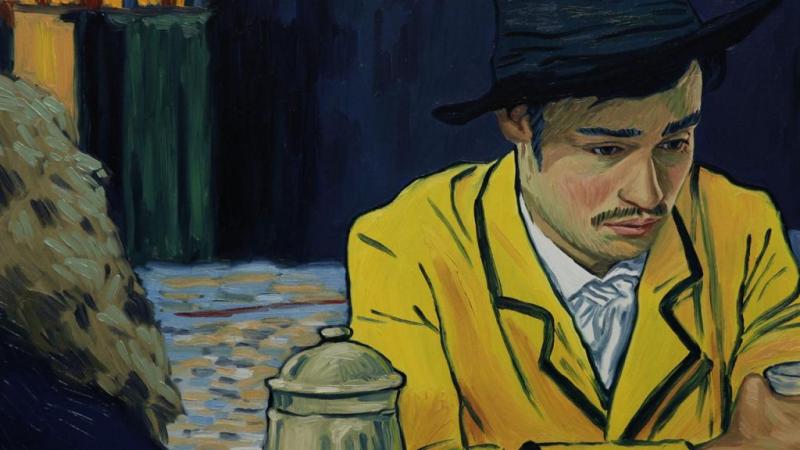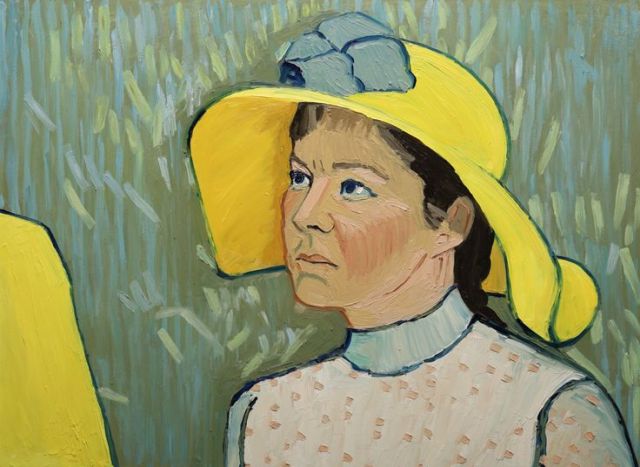Loving Vincent review - Van Gogh biopic of sorts lacks language to match its visuals | reviews, news & interviews
Loving Vincent review - Van Gogh biopic of sorts lacks language to match its visuals
Loving Vincent review - Van Gogh biopic of sorts lacks language to match its visuals
Artistry aplenty jostles cloth-eared writing in painstaking hagiography

Loving Vincent was clearly a labour of love for all concerned, so I hope it doesn't seem churlish to wish that a Van Gogh biopic some seven or more years in the planning had spent more time at the drawing board.
By now you'll have heard about the process whereby this film has come into being. The co-directors are the husband and wife team of Hugh Welchman and Dorota Kobiela, who shot scenes with real-life actors (many of them British) that were then given over to a rotoscoping technique that allowed for some 65,000 oil paintings drawn to match the almost scarily febrile landscape pioneered by Van Gogh. Amazing, huh? Indeed it is, in much the same way that one applauds obsessive gestures of any and all stripes (or perhaps "swirls" is here the more operative word). If the net result seems to want to generate plaudits on the basis of the task itself, Loving Vincent deserves every award going; only as a movie viewed in three dimensions, not as some lunatic gesture of hagiography, does it fall dramatically short. The story actually begins in Arles in 1891 a year after Van Gogh's death by suicide. Or was it? That's the conundrum that consumes a Rashomon-like narrative whereby the postmaster's son Armand (a notably full-lipped Douglas Booth) sets out to settle the matter of the painter's premature death at age 37 once and for all. (One competing theory posits that Van Gogh was murdered at the possibly accidental hands of a local, gun-happy teen by the name of René Secrétan.) Meanwhie, the application of Van Gogh's own artistry to a work about his life and art reminds one of the (infinitely superior) legerdemain on display in Sunday in the Park with George, the Stephen Sondheim masterwork that deploys musical pointillism in the service of its pointillist subject. Nor did that Pulitzer prize winner need musings on the order of "I wonder whether people will appreciate what [Van Gogh] did."
The story actually begins in Arles in 1891 a year after Van Gogh's death by suicide. Or was it? That's the conundrum that consumes a Rashomon-like narrative whereby the postmaster's son Armand (a notably full-lipped Douglas Booth) sets out to settle the matter of the painter's premature death at age 37 once and for all. (One competing theory posits that Van Gogh was murdered at the possibly accidental hands of a local, gun-happy teen by the name of René Secrétan.) Meanwhie, the application of Van Gogh's own artistry to a work about his life and art reminds one of the (infinitely superior) legerdemain on display in Sunday in the Park with George, the Stephen Sondheim masterwork that deploys musical pointillism in the service of its pointillist subject. Nor did that Pulitzer prize winner need musings on the order of "I wonder whether people will appreciate what [Van Gogh] did."
Attired in the yellow of canvas legend (specific paintings were the inspiration throughout) so as to resemble a walking bumblebee, Booth's inquisitive Armand synthesises testimony from a motley assemblage (Saoirse Ronan, Helen McCrory, pictured above, and Jerome Flynn are amongst those who get a look-in), even as the storytelling ranges from the lushly multi-coloured present of his inquiry to a grainier black-and-white past.
It's difficult on the one hand not to feel as if one is watching a sort of eccentric variant on Murder on the Orient Express, itself about to get a celluloid reboot, while at the same time adding to a full-to-bursting catalogue of Van Gogh-themed work that includes a recent (and dismal) Off Broadway show, Van Gogh's Ear, and, inevitably, the Don McLean song "Vincent", which arrives on cue as a sentimental climactic flourish. Same old same old, you might think, which is to sell short the visual ravishment. Now if only Loving Vincent had applied some tough love to its script.
The future of Arts Journalism
You can stop theartsdesk.com closing!
We urgently need financing to survive. Our fundraising drive has thus far raised £49,000 but we need to reach £100,000 or we will be forced to close. Please contribute here: https://gofund.me/c3f6033d
And if you can forward this information to anyone who might assist, we’d be grateful.

Subscribe to theartsdesk.com
Thank you for continuing to read our work on theartsdesk.com. For unlimited access to every article in its entirety, including our archive of more than 15,000 pieces, we're asking for £5 per month or £40 per year. We feel it's a very good deal, and hope you do too.
To take a subscription now simply click here.
And if you're looking for that extra gift for a friend or family member, why not treat them to a theartsdesk.com gift subscription?
more Film
 Bugonia review - Yorgos Lanthimos on aliens, bees and conspiracy theories
Emma Stone and Jesse Plemons excel in a marvellously deranged black comedy
Bugonia review - Yorgos Lanthimos on aliens, bees and conspiracy theories
Emma Stone and Jesse Plemons excel in a marvellously deranged black comedy
 theartsdesk Q&A: director Kelly Reichardt on 'The Mastermind' and reliving the 1970s
The independent filmmaker discusses her intimate heist movie
theartsdesk Q&A: director Kelly Reichardt on 'The Mastermind' and reliving the 1970s
The independent filmmaker discusses her intimate heist movie
 Blu-ray: Wendy and Lucy
Down-and-out in rural Oregon: Kelly Reichardt's third feature packs a huge punch
Blu-ray: Wendy and Lucy
Down-and-out in rural Oregon: Kelly Reichardt's third feature packs a huge punch
 The Mastermind review - another slim but nourishing slice of Americana from Kelly Reichardt
Josh O'Connor is perfect casting as a cocky middle-class American adrift in the 1970s
The Mastermind review - another slim but nourishing slice of Americana from Kelly Reichardt
Josh O'Connor is perfect casting as a cocky middle-class American adrift in the 1970s
 Springsteen: Deliver Me From Nowhere review - the story of the Boss who isn't boss of his own head
A brooding trip on the Bruce Springsteen highway of hard knocks
Springsteen: Deliver Me From Nowhere review - the story of the Boss who isn't boss of his own head
A brooding trip on the Bruce Springsteen highway of hard knocks
 The Perfect Neighbor, Netflix review - Florida found-footage documentary is a harrowing watch
Sundance winner chronicles a death that should have been prevented
The Perfect Neighbor, Netflix review - Florida found-footage documentary is a harrowing watch
Sundance winner chronicles a death that should have been prevented
 Blu-ray: Le Quai des Brumes
Love twinkles in the gloom of Marcel Carné’s fogbound French poetic realist classic
Blu-ray: Le Quai des Brumes
Love twinkles in the gloom of Marcel Carné’s fogbound French poetic realist classic
 Frankenstein review - the Prometheus of the charnel house
Guillermo del Toro is fitfully inspired, but often lost in long-held ambitions
Frankenstein review - the Prometheus of the charnel house
Guillermo del Toro is fitfully inspired, but often lost in long-held ambitions
 London Film Festival 2025 - a Korean masterclass in black comedy and a Camus classic effectively realised
New films from Park Chan-wook, Gianfranco Rosi, François Ozon, Ildikó Enyedi and more
London Film Festival 2025 - a Korean masterclass in black comedy and a Camus classic effectively realised
New films from Park Chan-wook, Gianfranco Rosi, François Ozon, Ildikó Enyedi and more
 After the Hunt review - muddled #MeToo provocation
Julia Roberts excels despite misfiring drama
After the Hunt review - muddled #MeToo provocation
Julia Roberts excels despite misfiring drama
 London Film Festival 2025 - Bradley Cooper channels John Bishop, the Boss goes to Nebraska, and a French pandemic
... not to mention Kristen Stewart's directing debut and a punchy prison drama
London Film Festival 2025 - Bradley Cooper channels John Bishop, the Boss goes to Nebraska, and a French pandemic
... not to mention Kristen Stewart's directing debut and a punchy prison drama
 Ballad of a Small Player review - Colin Farrell's all in as a gambler down on his luck
Conclave director Edward Berger swaps the Vatican for Asia's sin city
Ballad of a Small Player review - Colin Farrell's all in as a gambler down on his luck
Conclave director Edward Berger swaps the Vatican for Asia's sin city

Add comment